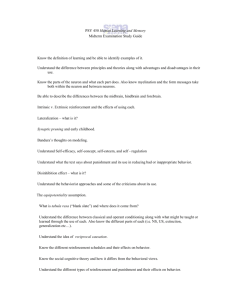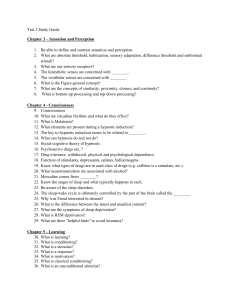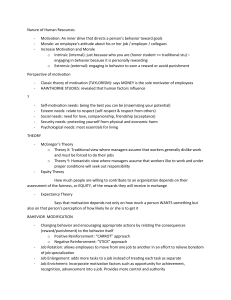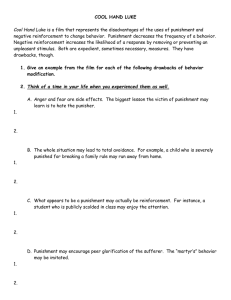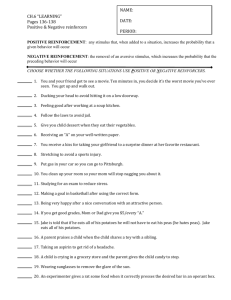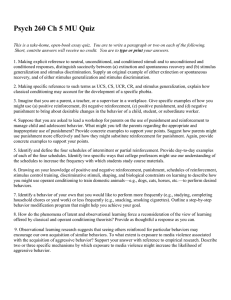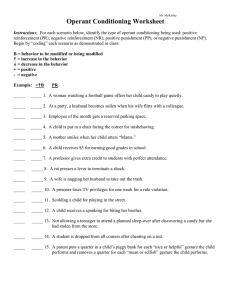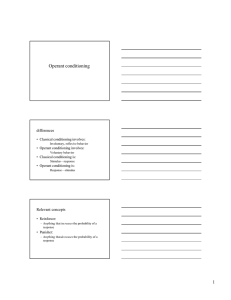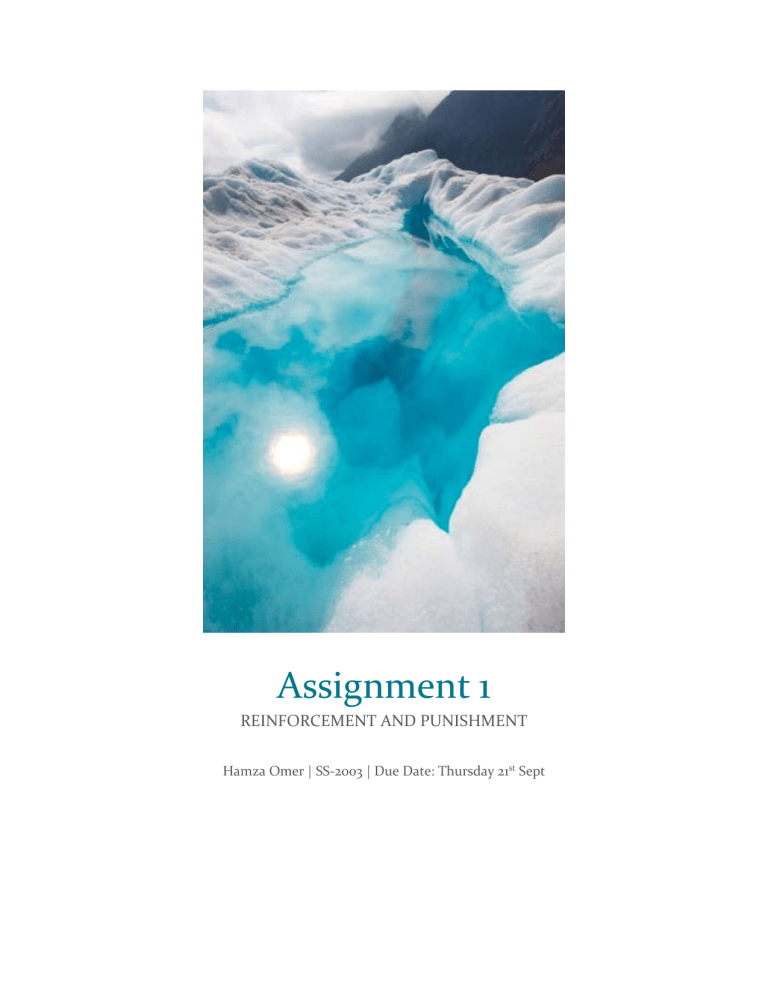
Assignment 1 REINFORCEMENT AND PUNISHMENT Hamza Omer | SS-2003 | Due Date: Thursday 21st Sept Reinforcement The process of reinforcement dictates that, irrespective of an introduction or removal of an external stimulus, the likelihood or probability of the repetitiveness of any desired behavior increases. There are differences however in how this repetitive favorable behavior is acquired, through positive or negative reinforcement. These are both very common components of Operant Conditioning. Positive reinforcement introduces a favorable stimulus in response to a desired behavior to encourage or reinforce that behavior. This increases the likelihood of said behavior being repeated. The stimulus introduced in positive reinforcement results in pleasant and rewarding outcomes. This can best be explained through practical examples, as this phenomenon is prevalent in our society whether we do it consciously or otherwise. Although positive reinforcement provides the subject with motivation to continue the desired behavior, it creates an over reliance on external factors for the long-term establishment of the desired behavior. Once the reinforcement stops, the probability of that behavior being reproduced would decrease immensely. − My parents have always been very target oriented and very particular about studies, so they’d always emphasize the importance of excelling academically. Thus, whenever I performed well in a major examination, they would treat me to something nice in the form of dinner, dessert or a day out. All of these rewards can be considered as positive reinforcers which boosted my morale and encouraged me to keep excelling in my academics. − My father is a very big fan of table tennis; he used to play it a lot back in his day. A year ago, I also took interest in the sport and started getting better at it and when my father saw this, he bought me new equipment like racquet and balls. This I believe could be considered a positive reinforcement as the positive reinforcers (the new equipment) are a desirable stimulus that boost the likelihood of the desired behavior (me continuing to play the sport). − The most common form of positive reinforcement, experienced by almost all students comes in the form of certificates from their respective academic institutes. Certificates (for anything) serve a very important role in a student’s life as it is a way of the institute recognizing the efforts of the students which in turn motivates them to keep up that favorable attitude. The certificate acts as positive reinforcer here. Negative reinforcement, similar to positive reinforcement, also aims to increase the likelihood of a desirable behavior but it is achieved in a different way. This occurs in one of two ways, avoidance or escape. The behavior could be reinforced due to an avoidance of an unpleasant circumstance which dissipates as the likelihood of the behavior increases. An example of this would be if a teacher were to make her students sing a song every time, they were late to class; this reinforces the behavior of arriving at class early through the avoidance of a negative stimuli PAGE 1 (the singing). Another form of negative reinforcement is through escape. This is achieved through the escape of a certain stimulus altogether, studying for an exam to escape the feeling of anxiety. Negative reinforcement can be effective in the short-term and associate avoidance with behaviors but there are many controversies about this method. It could develop anxiety or stress disorders in patients and it lacks long-term prospects; it is not sustainable and could prove potentially destructive for the patient as everyone has different levels of tolerance for anxiety and stress. − I have a very bad habit of not maintaining a proper diet and eating at regular, consistent times. Sometimes I wouldn’t eat anything all day, for no apparent reason. This destructive behavior, naturally, has its own consequences. Whenever this happens, I feel down and sometimes sick the next day; there is also a very bad stomachache. Due to this consequence, the behavior of eating at regular times is increased to avoid those destructive feelings. − I also have a bad habit of staying up very late; sometimes not sleeping at all. Although this originated from the night life of Saudi Arabia (where I grew up) it’s still destructive. Whenever this happens, I am extremely unproductive that day and feel drowsy the whole time. This leisure makes me very anxious about the work I was supposed to get done that day and I start spiraling downwards into more unpleasant moods. Thus, to avoid this horrible feeling I have started to restrict the staying up late to a minimum and have more productive days, when I’m supposed to get work done. − I had an instructor in high school who did not like student’s phones ringing during class so he had a rule that if your phone rang, you’d have to pick it up on speakerphone and let everyone hear your conversation and you couldn’t mention the scenario to the caller. It was quite hilarious for the rest of the class but excruciating for the person going through it. This acted as a negative reinforcer and increased the chances of students keeping their phones on airplane mode. PUNISHMENT Punishment is a behavioral concept which aims to decrease the probability of occurrences of certain undesirable behaviors. This can be achieved in one of two ways, positive punishment or negative punishment. Both of these processes are components of Operative Conditioning and aim to condition a subject’s behavior in a desired way. Positive punishment aims to reduce occurrences of a certain behavior through an immediate stimulus after said behavior. This stimulates a sense of consequence in the mind of the subject, causing a reduce in the likelihood of the behavior being repeated. The most common example of this sort of punishment would be, a child being scolded for talking out of turn or breaking a vase. Positive punishment has immediate benefits and can stimulate the subject’s brain into not performing that behavior again but it is a very short-term process and needs constant doses. PAGE 2 However, constant doses could result in the same effect as negative reinforcement which created anxiety disorders in patients and has minimal long-term benefits. − This one time in high school, during chemistry class, I wanted to crack a joke at something another classmate said and I didn’t realize that I spoke a little too loud. The instructor wasn’t slow to discipline me for this and immediately reprimanded me in front of the whole class. Needless to say, I won’t be cracking any jokes in another class any time soon. − I have been a very enthusiastic cat person all my life. When I was younger, I found a little kitten lost in our neighborhood and decided to take it in. My parents knew nothing of this and I fed and took care of the cat in our balcony for a little over a week. One day, the little cutie patootie decided to waltz into our house and defecated all over my mother’s new carpet. Consequently, my mother made me clean that carpet all by my (tiny) self. This punishment taught me to not take in feral or stray animals, at least inside my house. I have learnt to keep them in the balcony from now on. − One of my favorite fruits is mango. Whenever summer rolls around, we get a lot of mangoes and make milkshakes for the whole family. Often, I get carried away and drink more than my portion. My mother would discipline me by cutting off my mango milkshake privileges for the next week. Over time I learned that watching the rest of the family drink your favorite beverage while you’re sipping on your water is not a very pleasant feeling. Negative Punishment also aims to reduce occurrences of a certain behavior but this adopts a more direct method. This involves the removal of a positive or desirable stimulus from the subject’s environment, immediately after said behavior. This is a very common practice especially in this part of the world (South Asia). An example of this would be, parents confiscating a child’s mobile phone right after they act up. This associates the removal of a desirable stimulus (the phone) with the bad behavior (acting up) and the child would avoid repeating such actions in the future. Negative punishment might be the most effective form of conditioning behavior, in my opinion. It has an immediate impact on the patient and instills a sense of accountability for their actions and provides opportunity for self-reflection. Although, it could cause frustration and annoyance in the minds of the patients but ultimately, I think this would prove to be the most effective form of conditioning; it has the best long-term results. - When I was younger, I would put a blanket over myself and binge watch shows on my phone, late at night. This was completely unacceptable by my parents and whenever they would catch me, they would ban my phone for some period of time. This taught me to not stay up late, or at least not get caught :) - One time, I lied to my parents about when I’d be getting back home from a hangout with friends. They banned my outings for a month after that. This acted as a negative punishment for an undesirable behavior. PAGE 3 - My mother is very particular about financial management. Whenever I would fail to compute the monthly expenses or mismanage them, she’d reprimand me by sending less money the following month. Although this was effective in disciplining me in financial matters, it would still be considered a negative punishment as a desirable stimulus is removed. The major difference between negative reinforcement and negative punishment is that one enforces a particular behavior and the other reduces a certain behavior. Although they both involve some consequences for certain actions, they both serve different yet important roles in conditioning our behavior. Negative reinforcement involves the avoidance or removal of an undesirable stimulus resulting in increased likelihood of a certain behavior whereas negative punishment removes a desirable stimulus from the subject resulting in decreased intensity of certain behaviors. A child cleaning up their room to avoid his mother’s constant nagging would be negative reinforcement and a child cleaning up their room because they don’t want to be grounded would be negative punishment. PAGE 4
